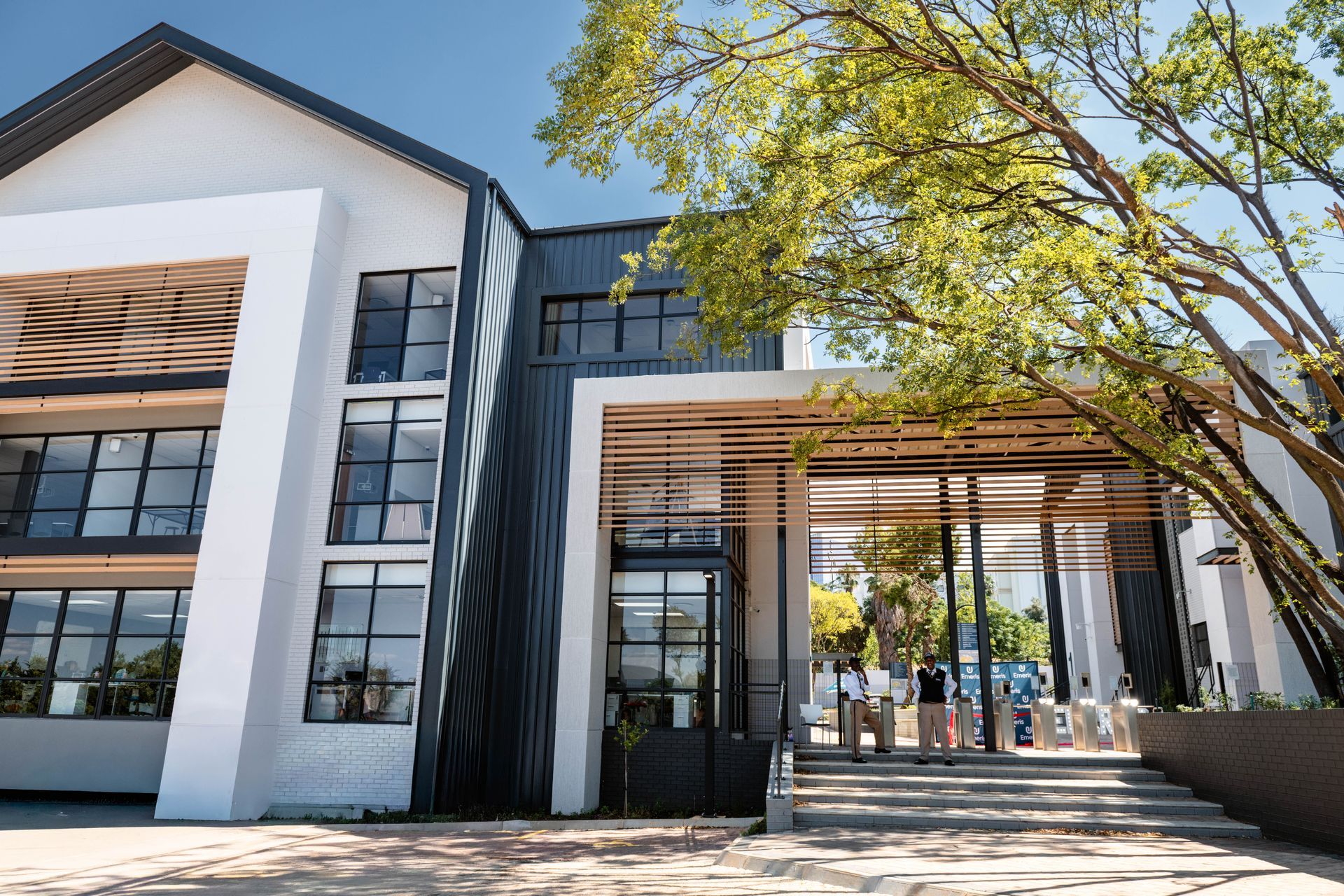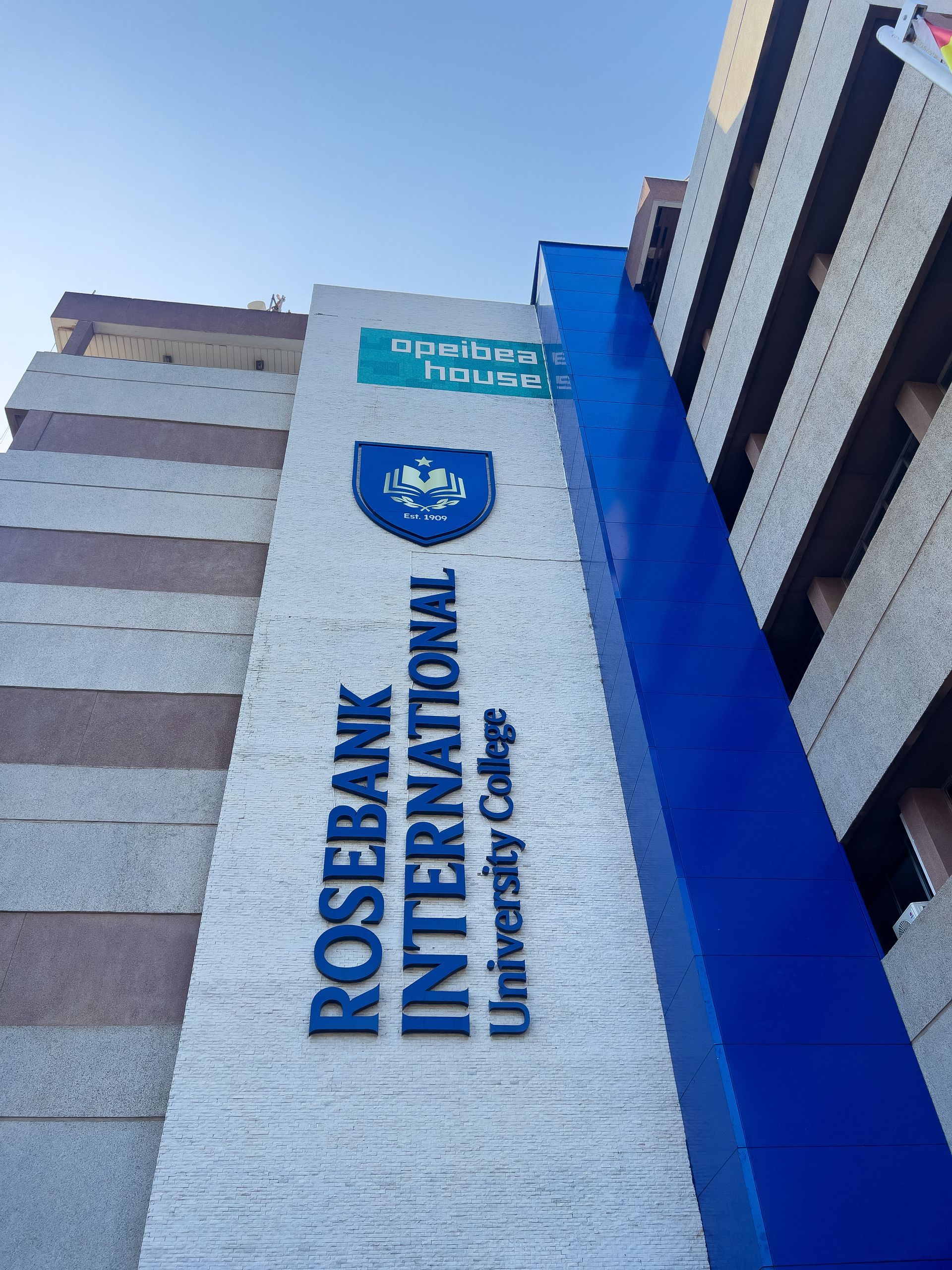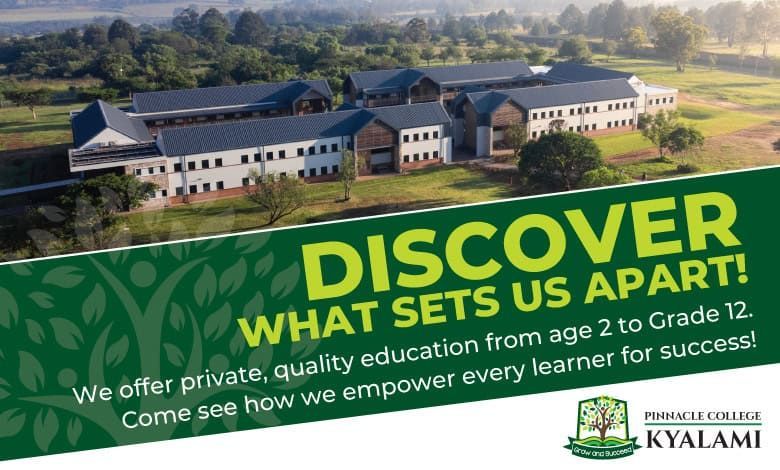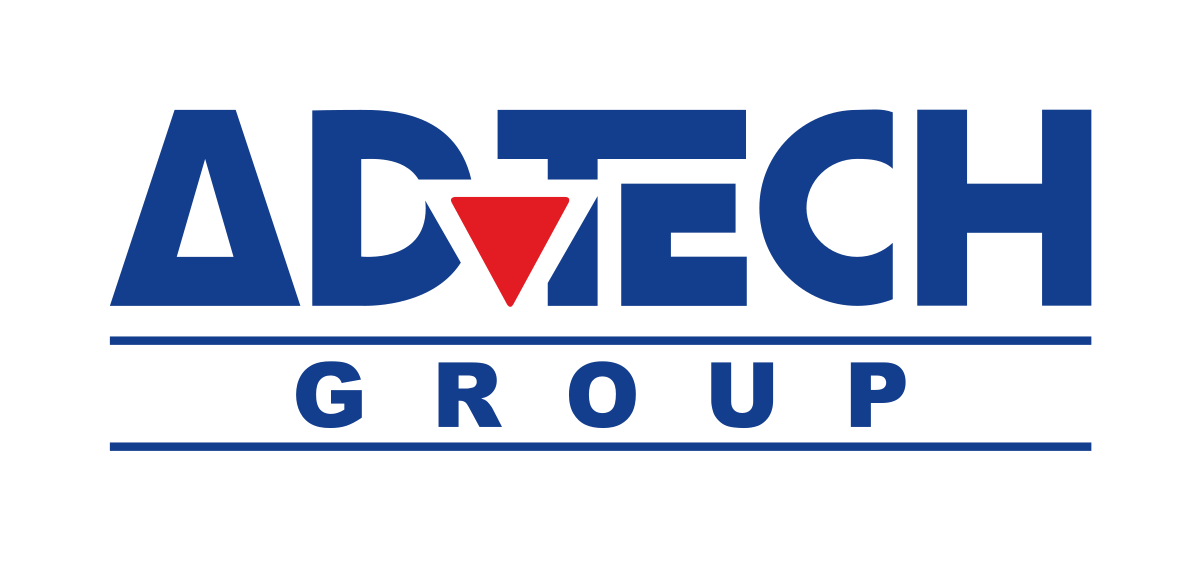ADvTECH delivers strong set of results and increases dividend by 45% Sustained contribution from all operating divisions
25 March 2024: Commenting on the results, retiring ADvTECH CEO, Roy Douglas, said: “ADvTECH’s robust financial performance for the year ended December 2023 is indicative of the group’s sound business model and quality assets. Our schools and tertiary divisions benefitted from good enrolment growth, moderate fee increases and enhanced operating leverage, while, in our resourcing division, we continued to benefit from our investment into the rest of Africa. This sustained performance is driven by the group’s established market position in South Africa and its growing presence across the continent.”
“Furthermore, the significant investments made by the group over a number of years are contributing meaningfully to earnings and cash generation. ADvTECH is now in a position where we are generating cash in excess of our investment funding requirements and consequently, the board has increased the dividend payout to shareholders by 45%.”
Group operational and financial performance
- Revenue up 13%
- Operating profit up 18%
- Normalised earnings up 20%
ADvTECH’s strong financial performance, solid cash generation and healthy balance sheet reflect the group’s sound business model, clear market positioning and emphasis on effectiveness and efficiencies.
Group revenue grew by 13% to R7 860 million for the year (2022: R6 961 million) as a result of good enrolment growth in both the schools and tertiary divisions, as well as from increased business activity in the resourcing division. Operating profit increased by 18% to R1 577 million (2022: R1 333 million) while the group operating margin improved to 20.1% (2022: 19.1%). Normalised earnings for the year increased by 20% to R950 million (2022: R790 million) while normalised earnings per share increased by 20% to 174.2 cents (2022 145.7 cents) per share.
Cash generated from operating activities increased by 10% to R1 940 million (2022: R1 766 million) illustrating the strong cash generating capacity of the group.
Capital expenditure was focused on meeting incremental demand via increasing capacity at existing sites as well as the development of a new school and a new tertiary site. Capital expenditure was also allocated to acquiring equipment and technology to enhance the group’s teaching and learning capability and was used to enhance business systems focused on the standardisation of group-wide processes to allow for further efficiency improvements.
The significant investments made by the group over a number of years have begun contributing meaningfully to both earnings and cash generation and, as a result, this reduced borrowings.
ADvTECH is now in the position where it is generating cash in excess of what is required to fund the group’s investment programme. Consequently, to better manage the group’s capital structure and optimise return on equity, the board elected to reduce the dividend cover and increase the dividend payout.
A final gross dividend of 57.0 cents (2022: 37.0 cents) per ordinary share in respect of the year ended 31 December 2023 was declared, bringing the full year dividend to 87.0 cents (2022: 60.0 cents) per share for the 2023 financial year.
Schools South Africa
- Revenue up 13%
- Operating profit up 18%
- Operating margin improved to 20.3%
The schools division continued to enhance its value proposition and win market share, despite the tough operating environment. All the division’s brands recorded volume and operating profit growth.
Revenue increased by 13% to R2 810 million (2022: R2 492 million) and operating profit increased by 18% to R570 million (2022: R484 million) with the operating margin improving to 20.3% (2022: 19.4%).
Students at ADvTECH recorded exceptional results in the 2023 Independent Examinations Board examinations achieving an impressive 99.7% pass rate, while 87.7% obtained a bachelor degree pass.
Schools in the rest of Africa
- Revenue up 14%
- Operating profit up 43%
- Operating margin improved to 30.0%
ADvTECH’s school brands in the rest of Africa recorded strong enrolment growth. Revenue increased by 14% to R381 million (2022: R334 million) while operating profit improved by 43% to R114 million (2022: R80 million) despite the impact of the weakening Kenyan Shilling. The operating margin advanced from 23.9% to 30.0%.
Capacity was increased at Crawford International School in Kenya as it continued to experience strong demand. All of the final year students that completed their A-Level qualification were accepted into international universities.
Gaborone International School (GIS) in Botswana continued to perform exceptionally well with strong enrolment growth and market leading academic results. The students achieved a 99.7% pass rate in the International General Certificate of Secondary Education (IGCSE) exams.
Tertiary/University
- Revenue up 10%
- Operating profit up 16%
- Operating margin improved to 26.4%
ADvTECH’s tertiary division continues to perform well, growing off the back of a well-established portfolio of quality brands that offer a comprehensive range of programmes and qualifications. The group’s ability to provide multi-channel modes of delivery (contact, blended, online, full-time, part-time and distance) is central to it proposition and allows the division to meet the requirements of every student at any time, at any location.
Revenue increased by 10% to R2 988 million (2022: R2 728million) and operating profit grew by 16% to R787 million (2022: R680 million). Operating margin increased to 26.4% (2022: 24.9%) benefitting from effective cost containment measures.
The Varsity College campuses in Pretoria and Midrand were expanded in response to growing demand. Equally so, Rosebank College acquired additional capacity at its mega-campuses in Braamfontein and Pretoria, and opened a new digitally enabled campus in Mbombela in January 2024.
Resourcing
- Revenue up 26% in rest of Africa
- Operating profit up 28% in rest of Africa
The strategy to expand into the rest of Africa continues to bear fruit. Volumes grew substantially over the year resulting in revenue increasing by 26% to R1 452 million (2022: R1 155 million) and operating profit by 28% to R105 million (2022: R82 million).
The South Africa resourcing business’ revenue contracted by 9% to R229 million (2022: R252 million) due to the disposal of the group’s 51% share of the Contract Accountants group in the second half of the prior financial year, along with the tough trading environment.
Retirement of Roy Douglas and appointment of Geoff Whyte
As indicated in previous announcements, on 29 February 2024, Roy Douglas officially retired and stepped down as the CEO of ADvTECH. One of his last formal responsibilities, however, will be to present the financial results to the market. Roy will be joined at the results presentation by the new group CEO, Geoff Whyte.
Commenting on the developments, board chairperson, Chris Boulle commented: “Roy has successfully led the group in its expansion strategy during his tenure, resulting in ADvTECH becoming the leading private education and recruitment group across the continent. He leaves ADvTECH in a strong position to continue its growth trajectory. The board wishes to thank Roy for his invaluable contribution during his tenure as CEO and wishes him well in his retirement.”
“The board is similarly pleased with the appointment of Geoff Whyte as CEO and are confident that Geoff’s track record and experience will enable him to build on the group’s successes.”
Prospects
The continued growth in demand for quality education in South Africa, particularly in the rest of Africa, persists. Consequently, the group remains confident that it will be able to sustain its growth trajectory due to its ability to convert demand into continued enrolment growth, at both the schools and tertiary divisions.
Commenting on the group’s outlook, Douglas said: “ADvTECH remains very well positioned to benefit from the increase in demand for education in South Africa and particularly in the rest of Africa. Our focus on productivity, efficiency and leveraging scale to deliver value in quality education remains key to our continued growth.”
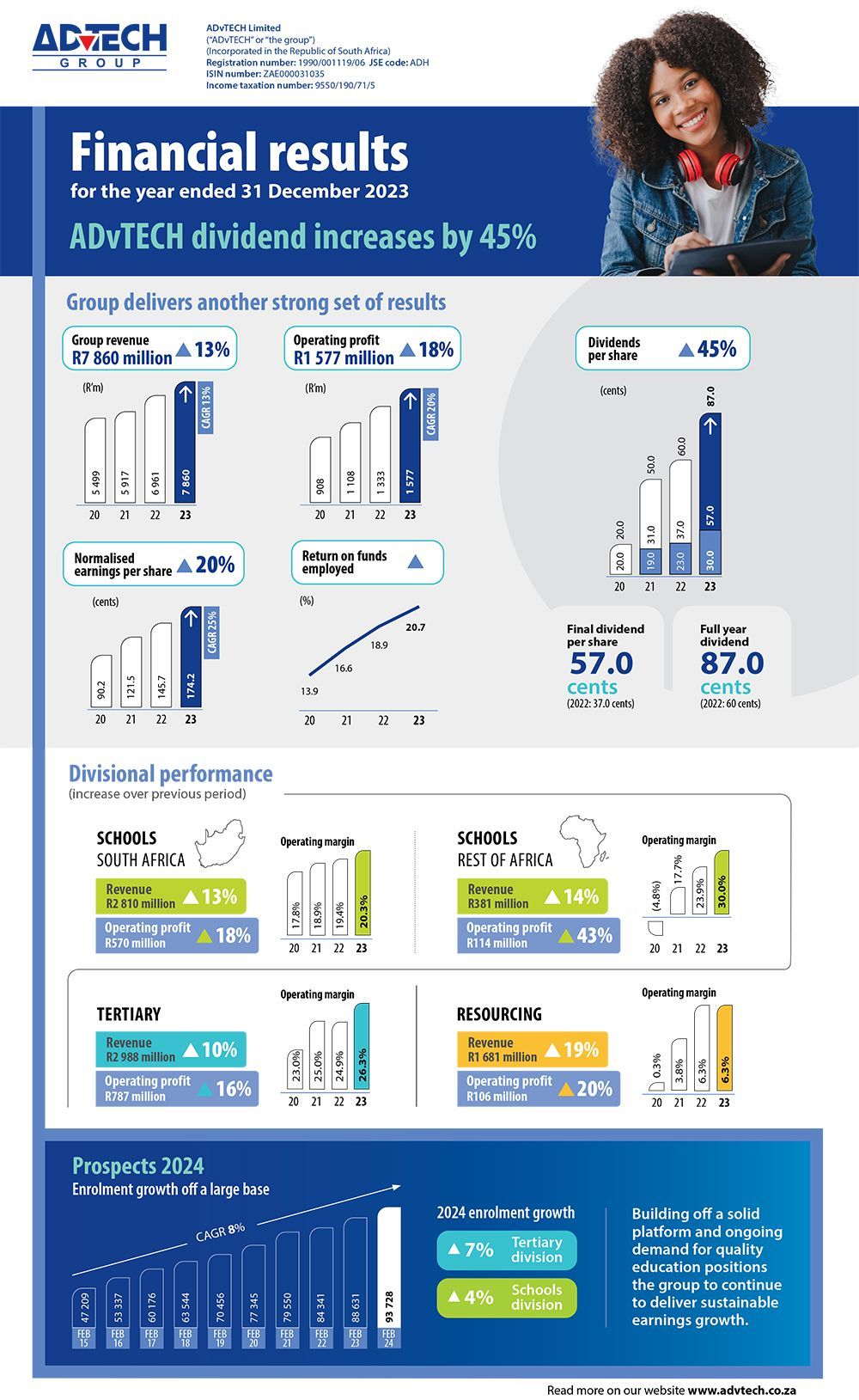
ADvTECH Updates
